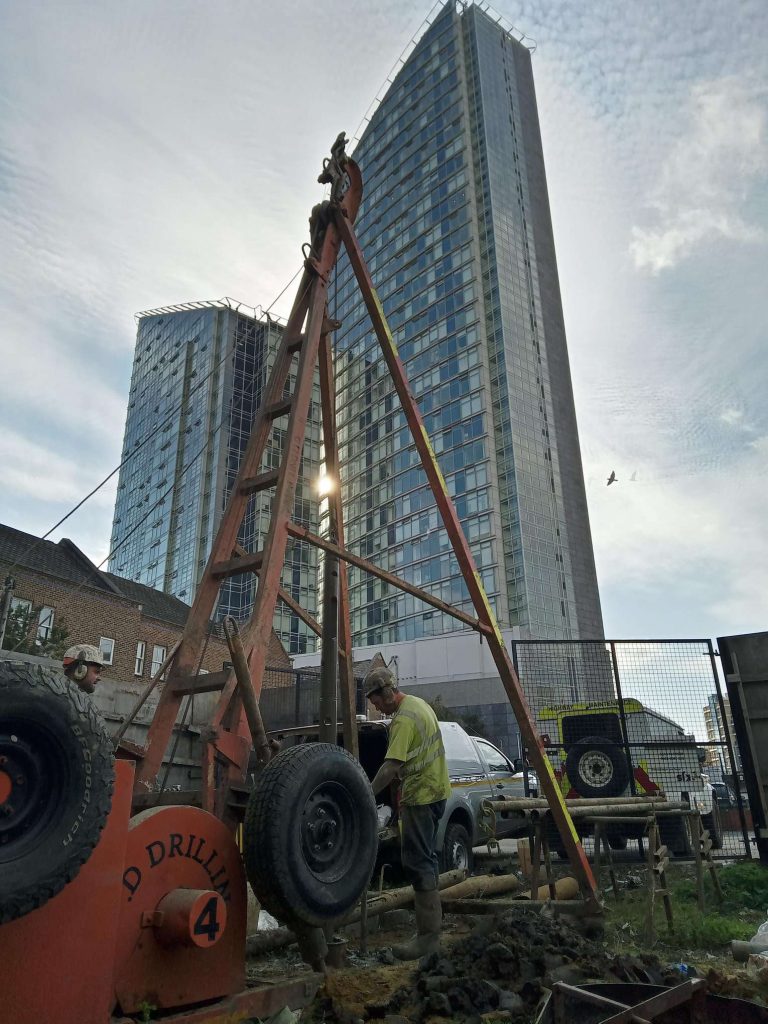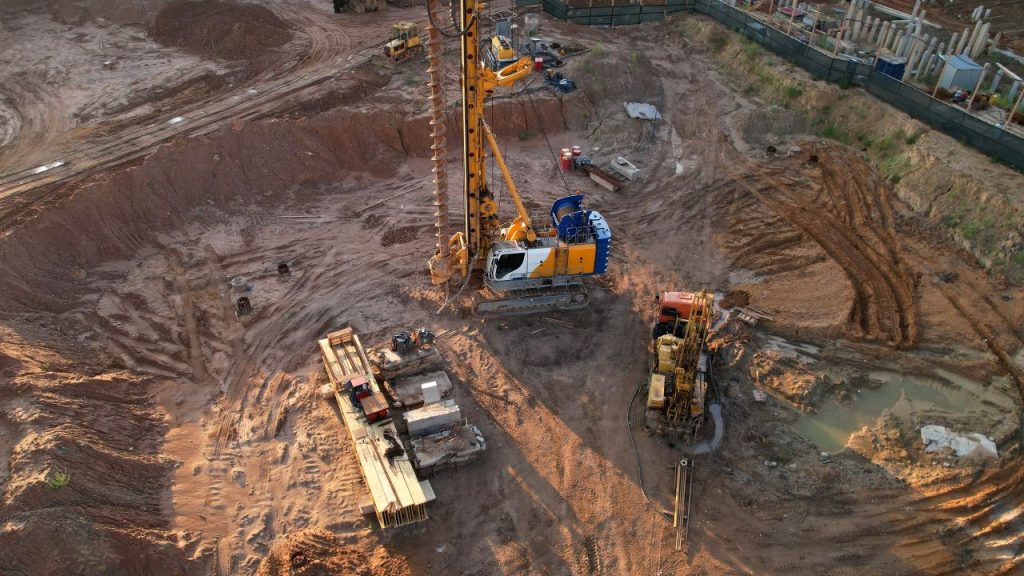Vital Qualities of Effective Civil Consulting Engineers
Vital Qualities of Effective Civil Consulting Engineers
Blog Article
An In-depth Overview of the Key Duties of Geotechnical Designers in Website Characterization and Ground Improvement Strategies for Design Solutions
Geotechnical designers are important to the successful execution of engineering tasks, entrusted with the important obligations of website characterization and the application of ground enhancement techniques. Their work involves a complete evaluation of subsurface conditions, using various screening methods to identify soil and rock residential properties.
Function of Geotechnical Designers
Geotechnical engineers play a critical duty in the design and building of framework by evaluating the behavior of dirt and rock below the surface - geo tech engineering. Their obligations incorporate reviewing subsurface problems to notify layout decisions that make sure structural stability and security. By carrying out in-depth analyses of dirt properties, consisting of shear compressibility, leaks in the structure, and strength, geotechnical engineers provide critical data that influences the choice of proper building and construction materials and strategies
In enhancement to examining dirt mechanics, geotechnical engineers are entrusted with determining potential threats such as landslides, sinkholes, and ground settlements. Their proficiency helps reduce risks related to these geotechnical sensations, therefore shielding both the environment and public safety. They additionally collaborate closely with various other engineering self-controls, ensuring that geotechnical factors to consider are integrated into total job style.
In addition, geotechnical designers engage in the examination of existing frameworks, offering recommendations for retrofitting and fixings when needed. Their thorough understanding of soil-structure communication is crucial for the growth of lasting facilities services. Overall, the duty of geotechnical engineers is important to the effective understanding of construction tasks, guaranteeing they are secure, long lasting, and compliant with regulatory criteria.

Site Characterization Procedures
Effective site characterization processes are vital for comprehending the subsurface problems that affect task design and implementation. Geotechnical designers employ a methodical strategy to gather, examine, and analyze information relating to dirt, groundwater, and rock characteristics. This process begins with an extensive review of existing literary works and historical website data, supplying understandings into previous website conditions and potential obstacles.

Information analysis complies with fieldwork, where designers use geostatistical methods to translate findings and produce geological versions. Through thorough website characterization, geotechnical designers lay the groundwork for effective task execution, lessening unexpected issues and optimizing resource appropriation.
Soil and Rock Testing Approaches
While comprehending subsurface conditions is essential, the selection of proper dirt and rock screening approaches is equally vital for precise evaluation and style. Geotechnical engineers utilize a selection of screening strategies to evaluate the physical and mechanical properties of soil and rock materials.
Laboratory tests, such as Atterberg limits, grain dimension analysis, and unconfined compressive stamina tests, supply crucial information on dirt actions under various dampness problems and loading situations. These tests assist establish dirt classification and anticipate negotiation or shear stamina characteristics crucial learn this here now for foundation style.
In-situ testing methods, consisting of Criterion Penetration Tests (SPT), Cone Infiltration Examinations (CPT), and pressure meter tests, permit designers to gather data directly from the ground. These approaches supply valuable understandings right into the dirt's thickness, uniformity, and stratification without the demand for comprehensive sampling.
Rock screening normally includes core tasting and laboratory evaluation to examine properties like uniaxial compressive toughness and rock high quality designation (RQD) With each other, these soil and rock screening techniques enable geotechnical designers to make informed choices relating to site-specific difficulties, guaranteeing the safety and security and stability of design remedies.
Ground Renovation Methods
Ground improvement methods are vital for enhancing the engineering residential or commercial properties of dirt, thus raising its load-bearing ability and decreasing negotiation. These approaches are critical in addressing obstacles presented by weak or bothersome dirts, which can considerably impact the security and sturdiness of frameworks.
Various ground enhancement strategies are employed, including compaction, grouting, and dirt stablizing. Compaction involves enhancing the thickness of dirt through mechanical ways, which boosts its shear strength and decreases compressibility. Grouting, on the various other hand, entails injecting a liquid product right into the ground to fill voids and improve dirt communication. This strategy is particularly effective for treating loosened sands or broken rock.
Soil stablizing incorporates an array of methods, from chemical additives to mechanical treatments, focused on improving the soil's resistance to erosion and deformation. Techniques such as lime stabilization or cement blending change the properties of the dirt at a bit level, boosting its total efficiency.
Relevance of Geotechnical Analyses
Geotechnical evaluations play an important role in the preparation and layout of design projects, as they provide crucial details concerning the subsurface problems. Comprehending soil properties, rock developments, groundwater degrees, and possible geohazards is essential for guaranteeing the stability and safety and security of structures. These assessments make it possible for designers to make educated choices regarding site selection, layout specifications, and building and construction techniques.
The significance of geotechnical assessments expands past preliminary project stages; they are critical in danger management and price effectiveness. By identifying possible problems early, such as dirt settlement, slope instability, or extreme groundwater, engineers can create ideal mitigation strategies, lowering the possibility of pricey delays and architectural failures. These assessments support conformity with governing requirements and enhance the sustainability of engineering methods.

Final Thought
In conclusion, geotechnical designers are important to guaranteeing the security and stability of design jobs via detailed site characterization and ground enhancement techniques. geotech engineer. Their systematic strategy to evaluating subsurface problems, combined visit homepage with their suggestions for reliable ground adjustment, dramatically enhances dirt residential properties and load-bearing capability. The experience of geotechnical engineers not just facilitates informed project preparation however likewise makes sure conformity with guidelines and cultivates effective from this source communication amongst stakeholders, ultimately adding to effective design end results
Geotechnical engineers play a critical function in the layout and construction of infrastructure by examining the actions of dirt and rock beneath the surface. By conducting in-depth evaluations of dirt homes, consisting of shear toughness, compressibility, and leaks in the structure, geotechnical engineers provide vital data that influences the choice of suitable building materials and techniques.
In addition to analyzing dirt technicians, geotechnical designers are entrusted with determining prospective risks such as landslides, sinkholes, and ground settlements. Geotechnical engineers employ a systematic method to gather, evaluate, and analyze information pertaining to groundwater, rock, and soil qualities. By identifying potential concerns early, such as soil settlement, slope instability, or too much groundwater, engineers can devise appropriate reduction approaches, lowering the probability of expensive delays and architectural failures.
Report this page